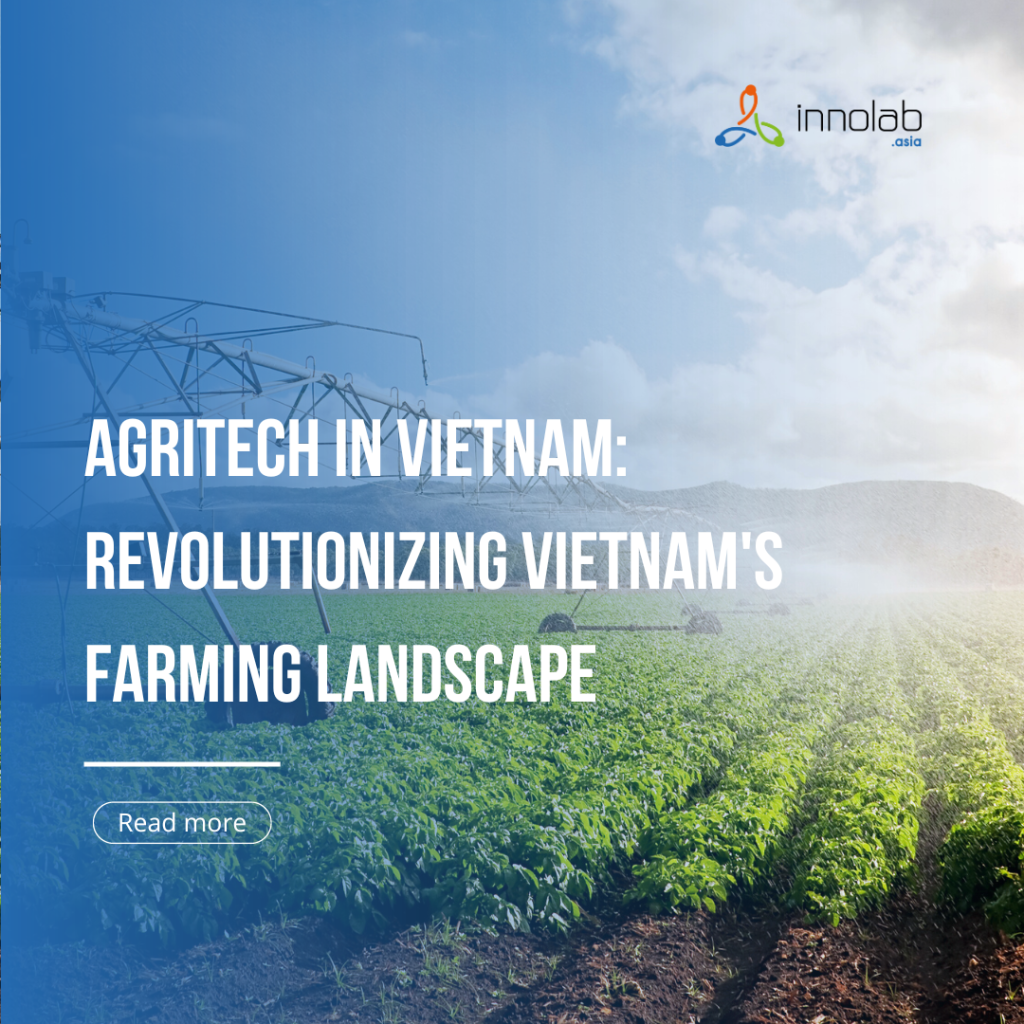Overview of Vietnam’s agriculture
Vietnam largely remains an agricultural country despite significant growth in technology. According to a report by Statista in October 2022, agriculture accounted for 12.56% of Vietnam’s GDP in 2021, highlighting its economic importance. Additionally, the sector plays a vital role in employment, providing 39.45% of total jobs in the country.
Figure 1:GDP Contribution of the Agriculture, forestry, and fishing sector in Vietnam from 2011 to 2021.
Source: Statista
The agricultural sector in Vietnam encompasses various aspects, including crop production, livestock, fisheries, and forestry. The country is renowned for its agricultural products such as rice, pepper, tea, coffee beans, cotton, peanuts, and sugarcane. With a 12-month growing season and the potential for two to three harvests per year, Vietnam benefits from favorable conditions for agriculture.
Figure 2: Vietnam Agriculture Overview (as of 15th August 2021) (Business Center British Chamber of Commerce Vietnam 2021)
In the wake of the pandemic, experts emphasize the significance of rapid digital transformation in the agricultural industry for recovery and development. Digitalization is seen as a key driver to sustainably propel Vietnam’s agricultural sector amid challenges posed by climate change, market fluctuations, and evolving consumption patterns.
Overall, embracing digital advancements presents an opportunity for Vietnam’s agriculture industry to thrive, reinforcing its position as a crucial pillar of the nation’s economic growth.
Agritech in Vietnam
Agritech (or Agtech) refers to the application of technology in agriculture with the goal of increasing output, efficiency, and profitability. Agritech startups in Vietnam respond to these challenges by developing environmentally friendly, affordable, and easy-to-integrate solutions. They are also constantly working to bridge the equality gap regarding access to safe food, water, and dietary needs. This sets Vietnamese agritech startups apart from other agritech startups in Southeast Asia.
Despite being an agricultural country, Vietnam’s agritech industry is still lagging behind that of other countries. In contrast, despite a huge number of small-holder farmers, Vietnam has a restricted number of agritech firms and initiatives. Specifically, according to the British Chamber of Commerce Vietnam, while there are 28 million employees in the agri-food sector, there are only 48 agritech firms in the market (Tracxn 2022). As a relatively new concept in Vietnam, especially in rural areas, while technology has been incorporated into agriculture for years in more developed nations such as the Netherlands, Australia, and Israel, it is still difficult to integrate contemporary technology into Vietnam’s agricultural industry.
According to Tech Collective, the agricultural industry in Vietnam is booming and can anticipate new agricultural trends in the future. Vietnamese agricultural technology startups have been exploiting innovative directions to transform farming methods. They are also looking to expand to other countries in Southeast Asia. There is also a collaboration between corporates and startups which are Viettel Corporation and Nextfarm, Intel Corporation and Demeter. In addition to startups collaboration, cooperation between farmers and enterprises via contracting proves to be an increasing and favorable trend (Department for International Trade 2019). AgTech also received intensive support not only from the government but also global interests and associations.
Vietnam’s progress in AgriTech
In Viet Nam’s digital agriculture, private firms prove to be continuous primary solution creators. VinEco, Hachi, TH True Milk, Vinamilk, Agrimedia, GreenCoffee, MimosaTEK, BacTom, RTAnalytics, Fsoft, TraceVerify, and the Digital Agriculture Association of Vietnam are among the most notable companies.
Public-private collaborations have aided in the advancement of digital agriculture innovation. The International Rice Research Institute, SwissRe, Sarmap, the German Society for International Cooperation, and the Swiss Agency for Development and Cooperation collaborated on the remote sensing-based Information and Insurance for Crops in Emerging Economies (RIICE) project to deliver advanced technologies to low-income farmers who would otherwise be unable to access them.
In 2017, Google, in conjunction with the VietNam Farmers’ Union (VNFU), launched a program to improve farmers’ digital skills by employing 40 trainers and 500 support workers to deliver training to at least 30,000 farmers in nine provinces by 2020.
Vietnam has 12 areas certified for hi-tech agriculture. The three most prominent zones are Hau Giang, Phu Yen, and Bac Lieu provinces. The State Bank of Vietnam (SBV) along with commercial banks have also offered a financial package of VND 100 trillion (US$4.37 billion) to support enterprises applying high-tech farming.
Startups to watch in Vietnam
According to Startup Blink (Global Startup Ecosystem Research and Mapping Center), in 2021, the number of food tech startups accounted for 2.8% of the total startups worldwide, with unicorn startups (valued at over 1 billion USD) representing only 0.3%.
In Vietnam, the number of startups in the agriculture and food sector is also relatively low compared to other fields. In 2022, the majority of venture capital investments flowed into startups in the fintech, retail, e-commerce, healthcare, and education sectors.
Attracting investment and entrepreneurship in the food-tech sector in Vietnam can be promoted by creating favorable conditions and a business-friendly environment. Besides, Vietnamese agricultural enterprises are constantly promoting the application of high digital technologies in production and processing to contribute to restructuring the agricultural sector.
Koina
Koina is an agritech startup in Vietnam that leverages technology and expertise to manage supply chains and develop market opportunities for Vietnamese agricultural products. The company distributes a wide range of fruits, vegetables, and agricultural products at reasonable prices and with good quality. Koina works closely with farmers to improve cultivation practices, increase land productivity, and enhance agricultural output through technological applications.
Demeter
Demeter was founded in 2017 by Pham Ngoc Anh Tung after executing a $4.4 million USD agriculture project in Ho Chi Minh City. The company initially developed an IoT-driven system at Cau Dat Farms, with support from several international farms. The system enables farmers to automate their operations and effectively manage their farm sites through cloud data storage that provides necessary information about weather, soil quality, etc.
MimosaTEK
Before 2018, the majority of Agritech startups focused mainly on the input stage of agricultural products, providing seeds and IoT (Internet of Things) devices to enhance farming productivity. One notable example is MimosaTEK, a company specializing in IoT devices for automated irrigation, founded by Mr. Nguyen Khac Minh Tri in 2012 in Ho Chi Minh City. Since 2012, MimosaTEK has only completed its seed funding round.
To increase revenue further, MimosaTEK is experimenting with a fertilizer business project for farmers using its IoT devices. With data collected from the system, the company can adjust the fertilizer amount according to each farmer’s cultivation area. This approach can help reduce fertilizer costs by at least 20%.
Foodmap
FoodMap, an agritech e-commerce platform connecting farmers and food producers directly to B2C and B2B customers, has raised an oversubscribed pre-Series A round of US$3 million, co-led by Vulpes Ventures and Beenext.
Launched in 2020 by Pham Ngoc Anh Tung, FoodMap aims to solve the gap between demand and supply across the invisible supply chain with a back-end management system for farmers and suppliers.
Kamereo
Like Foodmap, Kamereo companies focus on the distribution of agricultural products to end consumers and partially the input stage of the supply chain.
Kamereo primarily focuses on distributing vegetables to B2B channels such as hotels, restaurants, and food establishments, including stores and chains like Red Sun. During their fundraising round in July 2021, Kamereo had the participation of C.P. Mr. Taku Tanaka, the founder of Kamereo, stated that they are introducing C.P.’s products into their distribution system, reaching nearly 2,000 points in Ho Chi Minh City. “Compared to food, Kamereo only handles distribution and does not delve into the input stage like vegetables because of limited resources,” said Mr. Taku Tanaka.
Similarly, for fruits, this Japanese startup serves as a purchasing station in the Mekong Delta region. Through the Kamereo app, the company simplifies the process of ordering large quantities with minimal and more efficient resources compared to relying on call centers or OTT chat platforms. The data collected from the app is
Hachi
Hachi, founded in 2016, specializes in the development of hydroponic farming solutions for household and urban agriculture, utilizing IoT technology. The origins of Hachi trace back to a youth startup initiative at Vietnam National University of Agriculture and Hanoi University of Science and Technology, initially funded with 100 million Dong. The company’s innovative system incorporates various automated features such as watering, fan and mist controls driven by environmental sensors, along with a protective mesh structure to shield crops from excessive sunlight.
In comparison to traditional vegetable farming methods, Hachi’s system offers several advantages. It requires less land and light resources, while demanding minimal attention and care from farmers, who can conveniently grow fresh produce at home using just a smartphone. Hachi aims to integrate drip irrigation into their system, as it presents cost-saving benefits by reducing water and fertilizer consumption necessary for optimal plant growth.
SEO.AI
Sero.ai is an AI-driven agritech startup founded in 2016. Their platform connects farmers with experts and uses computer vision to identify and provide solutions for diseased plants. By collecting real-time data through images and sensors, Sero.ai offers proactive recommendations to farmers. The startup has gained considerable interest from investors and customers interested in agritech trends.
Opportunities & Challenges
Despite the relatively new concept, in terms of developing effective policies and incentives, diverse government agencies and stakeholders have made considerable commitments to the transition to new digital agriculture services. Viet Nam has created expanded regulatory frameworks that promote digital agriculture throughout the last two decades, although through fragmented policies and authorities. Notably, decision No.749/QĐ-TTg dated June, 2020 prioritizes agriculture as one of eight sectors for digital transformation (Chinhphu.vn 2020). Besides, in February 2021, a restructuring plan for agriculture towards 2021-2025 is approved for the development of a modern and sustainable agriculture associating it with the global value chain. Besides, the State Bank of Vietnam and other banks offer a financial package worth 100 trillion VND ($4.37 Billion) to leverage hi-tech agriculture business.
Over the years, the agricultural industry has also paid more attention to digital transformation solutions and applying technology to most areas of the industry. Up to now, most of the basic digital technologies in agriculture have been deployed or started to be tested in Vietnam such as Big Data, IoT, etc. According to the Digital Agriculture Profile of Vietnam (FAO 2021), Viet Nam has created a solid basis for digital agricultural solutions, and the ecosystem surrounding digital agriculture is constantly expanding. Because of affordability, accessibility, and strong government backing, connectivity and subscription rates are high. A number of digital agricultural technologies have had substantial success. With the trend of increasingly using digital technologies, Vietnamese agriculture is gradually transforming from traditional agriculture to modern agriculture. Moreover, AgriTech emerges as a relatively new sector which allows prolific space for developments and few competitors. (Figures and Events Review of the GSO 2021).
In addition to the achieved results, the process of agricultural digital transformation in recent years still has difficulties such as: Low level of mechanization, auxiliary technologies for agricultural development (mechanization, processing, etc.) deep processing, agricultural product testing lines…) are not adequate; small cultivation area; forecasting output of agricultural products is still mainly based on experience; agricultural enterprises have not invested much in digital transformation; the quality of human resources with high expertise in digital agriculture is still limited; Farmers’ awareness and skills in using digital technology are not high (Figures and Events Review of the GSO 2021).
Regarding legal aspects, while the Vietnamese government has favorable laws and regulations to encourage the use of high technology in agriculture, international enterprises may confront a number of challenges. The first challenge is the time it takes to import supply chains and equipment into Vietnam. The second issue is a lack of openness in incentives, environmental rules, and agricultural input and output management. This creates difficulties for international enterprises who want to develop into Vietnam and must negotiate their strategy. Moreover, Vietnam must create a more sustainable ecosystem to assure national food security and agricultural product quality. This demonstrates the need for more sustainable methods and non-toxic, environmentally friendly new technology.
Conclusion
Agriculture still plays a significant role in the Vietnamese economy, although it faces challenges including. The agricultural supply chain in Vietnam can be considered a challenging problem as it requires simultaneously addressing output productivity, procurement, and product distribution. However, over the past 10 years, the emergence of an increasing number of Agritech companies involved in these three stages has been complementing each other’s limitations to resolve bottlenecks. Of course, things are not easy, and traditional methods create significant resistance for companies like Koina, Kamereo, MimosaTEK, and others.
If you’re still looking for a safe set of hands to help you take a step further into Vietnam’s agriculture market, connect with InnoLab Asia for more in-depth, up-to-date, and personal investment advice. Contact us at helo@innolab.asia to enhance your chance of business success!
Reference
BritCham 2021, Vietnam Agritech Report, viewed 12 April 2022, <https://britchamvn.com/wp-content/uploads/2021/09/Agri-Tech-Sector-Report.pdf>.
Chinhphu.vn 2020, Phê duyệt ‘Chương trình Chuyển đổi số quốc gia đến năm 2025, định hướng đến năm 2030’.
Department for International Trade 2019, Vietnam Agritech Report, viewed 12 April 2022, <https://www.ukabc.org.uk/wp-content/uploads/2019/07/Agritech-Sector-Update-April-2019.pdf>.
Figures and Events Review of the GSO 2021 2021, Vai trò của người nông dân trong chuyển đổi số nông nghiệp, consosukien.vn, viewed 12 April 2022, <http://consosukien.vn/vai-tro-cua-nguoi-nong-dan-trong-chuyen-doi-so-nong-nghiep.htm>.
General Statistics 2022, Tăng trưởng khu vực Nông, Lâm nghiệp và Thủy sản bệ đỡ cho nền kinh tế và ‘tấm nệm’ cho công tác an sinh xã hội năm 2021, General Statistics Office of Vietnam, viewed 12 April 2022, <https://www.gso.gov.vn/du-lieu-va-so-lieu-thong-ke/2022/01/tang-truong-khu-vuc-nong-lam-nghiep-va-thuy-san-be-do-cho-nen-kinh-te-va-tam-nem-cho-cong-tac-an-sinh-xa-hoi-nam-2021/>.
Tracxn 2022, AgriTech Startups in Vietnam, tracxn.com, viewed 12 April 2022, <https://tracxn.com/explore/AgriTech-Startups-in-Vietnam>.
“5 promising agritech startups in Vietnam.” Tech Collective, 3 June 2021, https://techcollectivesea.com/2021/06/03/5-agritech-startup-vietnam/. Accessed 16 June 2023.
https://vietnamwaterportal.com/news/agricultural-sector-in-vietnam.html



